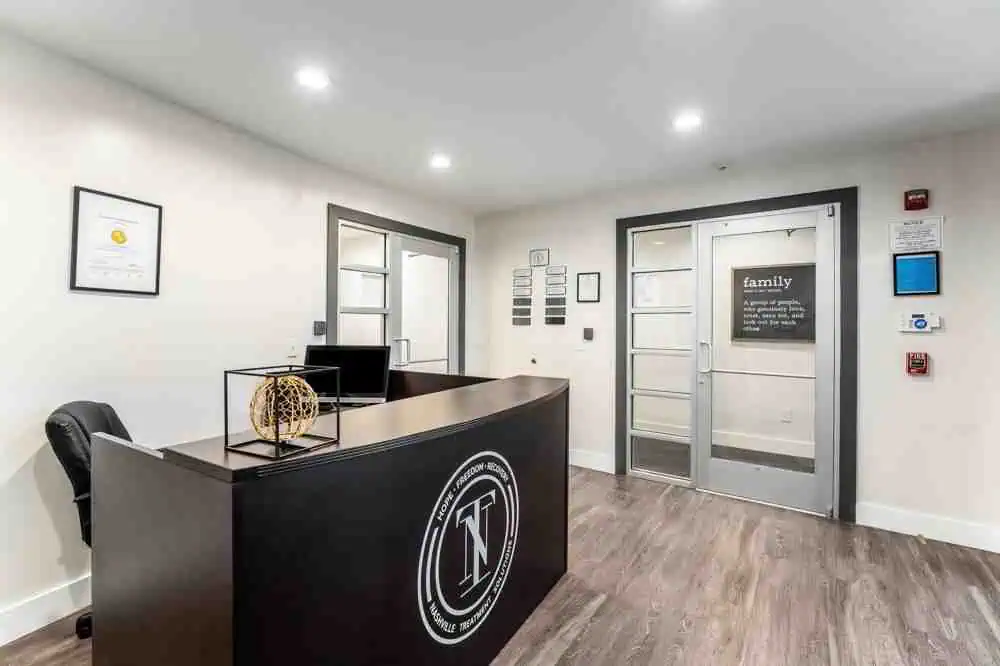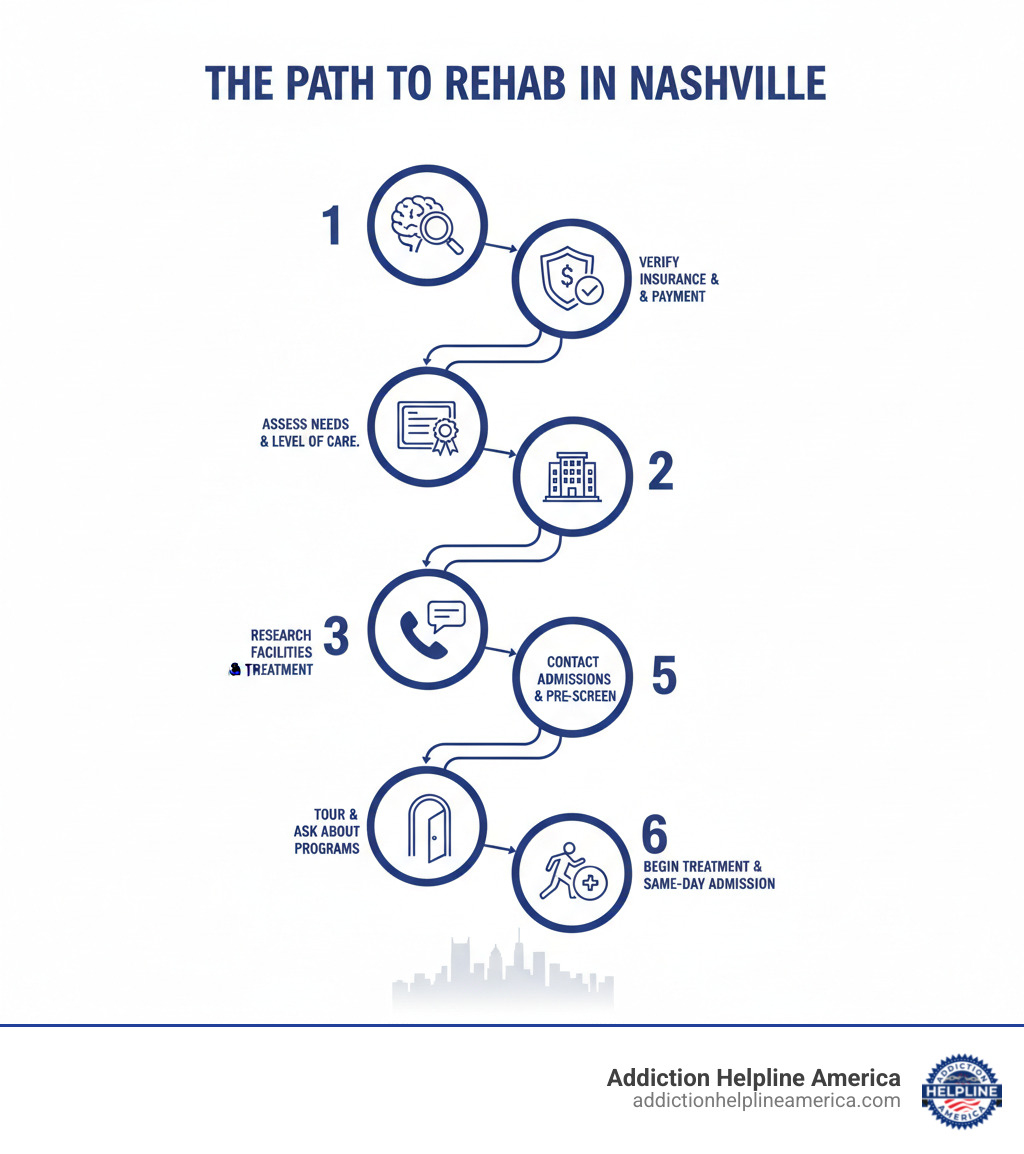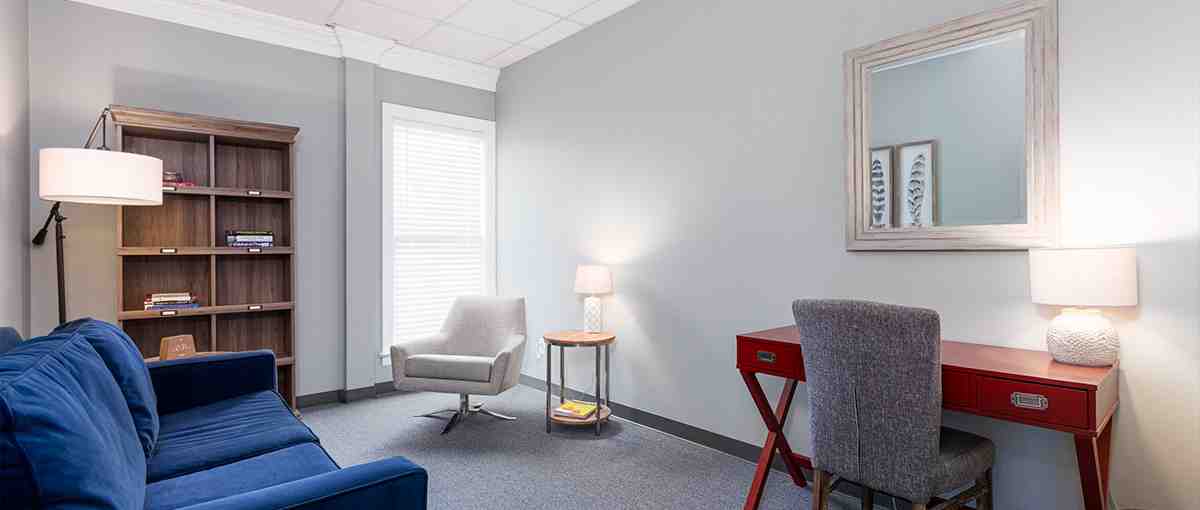
Why Nashville Is an Ideal Location for Addiction Recovery
Rehab in Nashville offers more than treatment—it provides a supportive community and a healing environment rooted in Southern hospitality. For those seeking addiction treatment in Nashville, the city is a hub for quality care.
Quick Overview of Rehab in Nashville:
- 68 treatment centers offering various levels of care (detox, inpatient, outpatient)
- Multiple payment options including private insurance, Medicaid, Medicare, and sliding scale fees
- Specialized programs for veterans, adolescents, dual diagnosis, and faith-based recovery
- Evidence-based therapies like CBT, DBT, and holistic approaches
- Same-day admission available at many facilities
- In-network with 25+ major insurance providers including Aetna, BCBS, Cigna, and UnitedHealthcare
Nashville’s location near Tennessee’s natural beauty provides a calming backdrop for recovery. The city’s treatment landscape is unique, offering both traditional 12-step programs and innovative holistic approaches. With 172 Tennessee rehab providers equipped to treat co-occurring mental health conditions, the city addresses the fact that about 50% of people with addiction also face mental health challenges.
At Addiction Helpline America, we connect individuals with the right rehab in Nashville for their needs. Our team understands the local treatment landscape and can guide you through insurance, admissions, and finding specialized programs.
Understanding Treatment Options in Nashville
With 68 different rehab centers, Nashville offers a wide range of choices to match your specific situation. The variety can feel overwhelming, but at Addiction Helpline America, we help you find the treatment that fits your needs, not just the first available bed. Nashville facilities range from medical detox to long-term residential and flexible outpatient programs. Many follow the American Society of Addiction Medicine (ASAM) criteria, a roadmap that matches people to the right intensity of care, ensuring a personalized approach.
Finding the Right Level of Care for Rehab in Nashville
Nashville’s treatment centers offer a full spectrum of care to support different stages of the recovery journey.
Medical detox is often the first step, especially for alcohol, opioid, or benzodiazepine dependence. It provides 24/7 medical supervision to safely manage withdrawal symptoms over several days to a week or more.
Inpatient or residential treatment involves living at the facility full-time, typically for 30 to 90 days. This immersive environment removes you from daily triggers, allowing you to focus entirely on recovery and building new coping skills.
Partial Hospitalization Programs (PHP) offer a similar intensity to inpatient care, but you return home at night. This option works well for those with a stable home environment who don’t require 24/7 supervision.
Intensive Outpatient Programs (IOP) are more flexible, with treatment three to five days a week for several hours, often in the evening. This allows you to continue with work or school while receiving substantial care.
Standard outpatient care is the most flexible option, involving weekly therapy sessions and support groups. It’s suitable for those early in their addiction or as a step-down from more intensive treatment.
Sober living homes are a crucial bridge after residential treatment. They provide a recovery-focused household with rules, drug testing, and accountability to support a transition back to daily life.
Types of Addiction & Mental Health Programs
Nashville’s rehabs cover nearly every type of substance use disorder, including alcohol, opioids (fentanyl, oxycontin), stimulants (cocaine, meth), and prescription drugs.
Opioid addiction programs are prevalent, and many centers offer medication-assisted treatment (MAT). Using medications like buprenorphine alongside therapy, MAT is an evidence-based approach that reduces cravings and improves recovery outcomes.
Crucially, approximately 50% of people with substance use disorders have dual diagnoses, meaning they also have a condition like depression, anxiety, or PTSD. Many start using substances to cope with these underlying issues.
Nashville is well-equipped for this complexity, with 172 Tennessee rehab providers offering integrated treatment for both addiction and co-occurring mental health conditions. Treating both simultaneously is vital for lasting recovery. If you face both challenges, look for centers specializing in dual diagnosis treatment. For more on integrated care, explore facilities like Integrative Health Centers Nashville TN, which takes a comprehensive approach.
Common Therapeutic Approaches in Nashville Rehabs
When you walk into a rehab in Nashville facility, you’re beginning a personalized journey that uses a blend of proven, evidence-based practices and innovative holistic methods. Your recovery plan is designed to find what works for you, helping you develop essential life skills and a strong mind-body connection to support long-term sobriety.
Evidence-Based & Traditional Therapies
These therapies are the backbone of effective addiction treatment, backed by research and proven to help people achieve recovery.
Cognitive Behavioral Therapy (CBT) helps you understand the link between your thoughts and actions. As Nashville Treatment Solutions explains, CBT teaches you to reframe recurring thoughts, identify triggers, and develop practical coping skills.
Dialectical Behavior Therapy (DBT) is ideal for those with intense emotions. Tree House Recovery Tennessee uses DBT to combine CBT with mindfulness, emotional regulation, and distress tolerance skills.
Motivational Interviewing helps you find your own internal motivation for change. This client-centered approach, also used by Tree House Recovery, guides you to resolve ambivalence about recovery.
12-Step Facilitation introduces the principles of AA and NA. Cumberland Heights offers a “12 Step Immersion” program, while Findy Place provides a 12-step spiritual retreat for men.
Family Therapy is crucial because addiction affects the entire family. Tree House Recovery includes family sessions to improve communication, heal relationships, and build a strong support system.
Trauma-Informed Care acknowledges the link between past trauma and addiction. Nashville Treatment Solutions incorporates these modalities to create a safe environment for healing without re-traumatization.
The Benefits of a Holistic Approach
True healing involves creating a new way of living that nourishes your mind, body, and spirit. Many facilities offering rehab in Nashville accept a holistic philosophy that goes beyond traditional therapy.
Centers like Tree House Recovery Tennessee and Brentwood Springs Detox champion this approach, ensuring you’re in the best mental, spiritual, and physical shape possible. This involves experiential therapies—hands-on activities that complement talk therapy.
- Yoga and mindfulness reduce stress and improve emotional regulation.
- Art therapy offers a creative outlet for expressing difficult emotions.
- Adventure therapy, used by Nashville Treatment Solutions, builds self-esteem and teamwork through outdoor challenges.
- Equine therapy helps build trust and emotional awareness through work with horses.
Tree House Recovery Tennessee focuses on a “healthy lifestyle-centered” approach, teaching habits around nutrition, exercise, and stress management. You can read more about their holistic approach to addiction treatment. Combining evidence-based and holistic methods creates a powerful synergy for recovery.
Navigating the Logistics of Rehab in Nashville
Once you decide to seek help, practical questions about cost, insurance, and the admissions process arise. Understanding the logistics of accessing rehab in Nashville shouldn’t be overwhelming.
How to Verify Insurance and Understand Costs
Quality addiction treatment is often more affordable than you think, as insurance may cover most of the cost.
- Private insurance plans, thanks to federal laws, must provide benefits for substance use treatment. Many Nashville centers are in-network with major providers like Aetna, Blue Cross Blue Shield, Cigna, and UnitedHealthcare, which lowers your out-of-pocket costs.
- Government insurance like Medicaid, Medicare, and TennCare also covers addiction treatment services.
- For those without insurance, many facilities offer self-pay options, payment plans, or sliding scale fees based on income.
Verifying your benefits is a crucial first step. At Addiction Helpline America, we offer free, confidential insurance verification. You can also call your provider directly. Key questions to ask include:
- What are my mental health and substance abuse benefits?
- What is my deductible, and has it been met?
- What is my out-of-pocket maximum, and has it been met?
- Do I need pre-authorization or a referral for addiction treatment?
- What is my co-payment or co-insurance for inpatient and outpatient services?
- Are there any limits on the number of days or sessions covered?
- Which treatment centers in Nashville are in-network for my plan?
- What percentage of out-of-network costs are covered, if any?
The Admissions Process & What to Expect
The admissions process for rehab in Nashville is designed to be straightforward and supportive. It begins with a confidential phone call for an initial assessment. An admissions specialist will seek to understand your situation to determine the appropriate level of care. Many centers offer pre-screening to streamline the process and can accommodate same-day admission, an option available at Nashville Treatment Solutions.
Once you’re ready, the facility will guide you on what to pack (comfortable clothing, toiletries, medications). Some, like Brentwood Springs Detox, offer a facility tour to help ease any anxiety.
What to Expect from a Rehab in Nashville
Quality care is distinguished by several factors.
- Accreditations from The Joint Commission or CARF, held by centers like Cumberland Heights and Brentwood Springs Detox, demonstrate high standards for patient care and safety.
- Staff qualifications should include licensed medical and therapeutic professionals. Many Nashville centers, including Nashville Treatment Solutions and Tree House Recovery, employ staff with personal recovery experience, adding a layer of empathy.
- The client-to-staff ratio indicates the level of individual attention. Nashville Treatment Solutions, for example, maintains an exceptional 2:1 ratio.
- Amenities and environment support the healing process. Facilities range from modern city centers to serene campuses like The Recovery Ranch TN and Cumberland Heights’ 177-acre property. Accommodations may include private or shared rooms, fitness facilities, and quiet spaces for reflection.
Finding Specialized Rehab Programs and Aftercare
Recovery is not one-size-fits-all, which is why rehab in Nashville offers a wide range of specialized programs. The best centers also understand that recovery is a lifelong journey, and they integrate aftercare and long-term support into their treatment.
Specialized Programs for Diverse Needs
Nashville has treatment centers designed with your unique background in mind.
- Veterans: Tree House Recovery Tennessee offers a dedicated program for veterans, addressing unique experiences like PTSD and the transition to civilian life. The Tennessee Valley Healthcare System Albion Street VA Clinic at Meharry Nashville also provides specialized care for service members.
- Adolescents and Teens: Cumberland Heights’ ARCH Academy is designed exclusively for teenagers, addressing their specific developmental and social challenges.
- Men-Only Programs: The Recovery Ranch TN and Findy Place offer men’s programs, creating a space to open up about addiction and masculinity in a supportive brotherhood.
- Women-Only Programs: The Recovery Ranch TN also operates a women’s rehab center, providing a safe environment to address issues like trauma, relationships, and societal pressures.
- Faith-Based Treatment: For those who find strength in faith, many Nashville facilities integrate spiritual principles, prayer, and scripture into the healing process.
Specialized care is also available for pregnant women, LGBTQ+ individuals, and seniors.
Aftercare and Long-Term Recovery Support
Completing treatment is the starting line for a new life, not the finish line.
- Discharge Planning: Before you leave, you’ll create a roadmap for your recovery, outlining continued therapy, support groups, and strategies for daily challenges. Brentwood Springs Detox emphasizes this transition.
- Alumni Programs: Active alumni networks, like the one at Cumberland Heights, provide a vital connection to peers who share your journey.
- Step-Down Care: This approach allows you to gradually transition from intensive treatment back to daily life. Findy Place offers a multi-phase program that includes long-term recovery housing.
- Relapse Prevention: Aftercare teaches you to recognize triggers, manage cravings, and build a strong support network to stay grounded.
- Support Groups & Therapy: Nashville has a vibrant recovery community with numerous AA and NA meetings. Continued therapy is also valuable for reinforcing skills and processing new challenges.
At Addiction Helpline America, we help you understand the full picture of recovery, including the aftercare that will support you for years to come.
Frequently Asked Questions about Rehab in Nashville
When you’re considering treatment, questions naturally arise. We’ve spent years helping people just like you find the right path, and these are the questions we hear most often about rehab in Nashville:
How long does a typical rehab program in Nashville last?
The duration of treatment is personalized to your unique situation.
- 30-day programs, like the residential retreat at Findy Place, provide crucial stabilization and introduce recovery tools.
- 60-90 day programs are often recommended, as research shows longer treatment leads to better outcomes. They allow for deeper work on underlying issues.
- Long-term options lasting several months are available for those with chronic addiction. Findy Place offers long-term recovery and step-down care.
- Medical detox at centers like Brentwood Springs typically lasts a few days to a week.
A comprehensive assessment will determine the right timeline for you. At Addiction Helpline America, we can connect you with specialists who’ll recommend a personalized timeline based on your specific needs, not just what fits a standard program structure.
What is the difference between inpatient and outpatient rehab?
This is one of the most important distinctions to understand when choosing rehab in Nashville, because it fundamentally shapes your daily experience during treatment.
Inpatient or residential rehab means you live at the treatment facility around the clock. It’s ideal for severe addiction, co-occurring mental health issues, or if you lack a stable home environment. You receive 24/7 medical and therapeutic support in a structured environment, free from outside triggers.
Outpatient rehab allows you to live at home while attending scheduled treatment sessions. This flexibility lets you continue with work, school, or family care. Levels include intensive Partial Hospitalization (PHP) and Intensive Outpatient (IOP) programs, as well as standard weekly care. It works well if you have a strong support system or are stepping down from inpatient care.
Can my family be involved in my treatment?
Yes—and we strongly encourage it. Most rehabs in Nashville recognize that healing the family system is essential for lasting recovery.
Centers like Tree House Recovery and Cumberland Heights offer dedicated family therapy sessions where your loved ones can participate in the healing process. These help family members understand addiction, improve communication, and establish boundaries that support recovery. Many facilities also provide educational programs for families.
While visitation policies vary, inpatient programs schedule time for family connection. Involving family helps rebuild trust and ensures everyone is part of the healing process.
If you’re worried about involving your family, talk with our team at Addiction Helpline America. We can help you understand how family involvement works and find programs that approach these relationships with sensitivity and care.
Conclusion: Take the First Step Towards a New Life
Choosing rehab in Nashville is a courageous first step. It’s about finding the right environment, people, and approach for your unique journey. Nashville’s recovery community is both comprehensive and compassionate, offering a path to a new life.
We’ve explored the city’s diverse treatment landscape, from its 68 treatment centers to specialized programs for veterans, teens, and those with dual diagnoses. You’ve learned about evidence-based therapies, holistic approaches, and the logistics of starting treatment.
Finding the right fit is crucial, and you don’t have to do it alone. At Addiction Helpline America, we have deep knowledge of Nashville’s treatment centers. We know which facilities excel at trauma care, offer same-day admission, or might be the perfect match for your needs.
Recovery is possible. Our team provides free, confidential, and personalized guidance to help you understand your insurance, explore options, and connect with the right treatment center. We are here to listen and guide you without pressure.
The first step is the most important. Find a Nashville rehab program that fits your needs today. Your new life is waiting, and we’re here to help you begin that journey with confidence and support.
Our helpline is 100%
free & confidential
If you or someone you care about is struggling with drug or alcohol addiction, we can help you explore your recovery options. Don’t face this challenge alone—seek support from us.
Programs
Resources
Will my insurance
cover addiction
treatment?
We're ready to help
Find the best
drug or alcohol treatment
center
Are you or a loved one struggling with addiction? Call today to speak to a treatment expert.

















